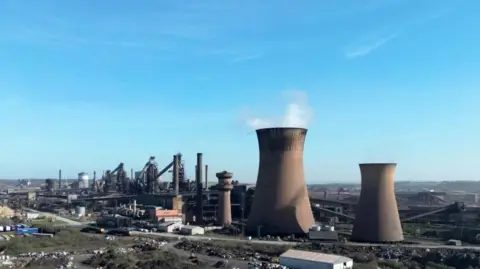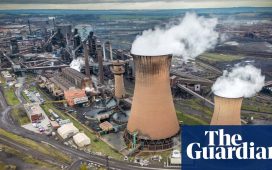Political reporter
Employment correspondent
Parliament has been recalled for a rare Saturday sitting to pass an emergency law aimed at saving British Steel’s Scunthorpe plant from imminent closure.
Sir Keir Starmer said the legislation would allow ministers to “take control” of the Lincolnshire site and stop its Chinese owner from closing its blast furnaces.
The move opens the door to a full nationalisation of the company at a later stage, with the prime minister saying “all options” remained on the table.
Talks have been taking place this week to keep production going at the firm, after owners Jingye said its blast furnaces were “no longer financially sustainable”.
MPs and peers are currently on their Easter break and were not due to return until 22 April, but both are now going back to Westminster for the hastily convened sitting.
Parliament sat on both Saturday and Sunday on the outbreak of World War Two in 1939. And there have been only five occasions since then when it sat on a Saturday, showing the importance the government is placing on the law.
Speaking at Downing Street on Friday, Sir Keir said the government wanted to pass the legislation in a single day, adding the future of the company “hangs in the balance”.
He said steelmaking was “essential for our future” and that he would always “act in the national interest to protect British jobs and British workers”.
“Jobs, investment, growth, our economic and national security are all on the line,” the prime minister said.
The BBC understands from a senior government source the emergency legislation being voted on in Parliament on Saturday would not give ministers the power to nationalise British Steel – another bill would be needed to do that.
Industry Minister Sarah Jones told BBC Breakfast the preference was for private investment alongside government funding to secure British Steel’s future, but there was not currently a company “that is there willing to invest at this point”.
Chinese company Jingye, which bought British Steel in 2020, says it has invested more than £1.2bn in the company to maintain operations, but has been suffering financial losses of around £700,000 a day.
The business department said the new law would give the government powers to order raw materials to keep the site’s two running blast furnaces going, with supplies otherwise due to run out in the coming weeks.
It added it would also allow ministers to direct the company’s board and workforce, and ensure anyone at the plant “who takes steps to keep it running, against the orders of the Chinese ownership” can be reinstated if they are sacked.
‘Foundation industry’
The company announced plans last month to shed jobs at the Scunthorpe site, which employs 2,700 people, blaming “highly challenging” market conditions, tariffs and costs associated with lower-carbon production techniques.
The government has offered £500m of support to partly fund a switch from blast furnaces to more energy efficient electric arc furnaces. But the offer has been rejected by the company.
Earlier this week, the government offered to buy the coking coal to keep the blast furnaces running until a longer-term solution to saving the plant could be found, but was unable to get the company to agree to this in tense negotiations.
Jones said the government believed Jingye had “not been acting in good faith” over talks to agree a deal.
“Things have reached an existential point where the company is refusing to bring in the raw materials we need to keep the blast furnaces running,” she added.
The business secretary is thought to have lost confidence in the company’s Chinese owners, with a government source saying they are “no longer trustworthy partners”.
Jingye says the blast furnaces are no longer sustainable, blaming “highly challenging” market conditions, tariffs and costs associated with transitioning to lower-carbon production techniques.
 Reuters
ReutersA ‘Save Scunthorpe Steel’ campaign will take place in the town on Saturday, including a parade at half-time during Scunthorpe United FC’s match against Spennymoor Town. The football club is nicknamed The Iron, a reference to the town’s connection with the steel industry.
The move to take control of the company has been welcomed by unions representing employees at the site, with Unite saying it would grant workers a “reprieve” while a longer-term solution is worked out.
“Ministers could not have allowed a foundation industry to go under,” added general secretary Sharon Graham.
The GMB union said the government’s move looked like the “first step” towards nationalisation, which it supported as the “only way to save the UK steel industry”.
Steelworkers’ union Community said the government could not allow the UK to become the only country in the G7 group of advanced economies “without primary steelmaking capacity”.
‘Sticking plaster’
Conservative leader Kemi Badenoch accused the government of having “bungled” the negotiations with British Steel.
“They must have seen this coming for a while,” she added.
“Instead of addressing it earlier in the week when Parliament was sitting, their incompetence has led to a last-minute recall of Parliament.”
Reform UK leader Nigel Farage said the government’s plan was just a “short-term sticking plaster”.
He added that his party would try to amend the emergency legislation to nationalise British Steel immediately, calling public ownership “the only option we have to save this vital strategic asset”.
Liberal Democrat leader Sir Ed Davey said “nothing should be off the table in this matter of national security” and added that the recall of Parliament should be seen as “an opportunity to come forward with a serious plan for the sustainable future of domestic steel production”.
The Green Party of England and Wales said it backed nationalisation as the “only sure way to secure this strategically important sector”.
Parliament was last recalled from a scheduled break in August 2021 to discuss the US withdrawal from Afghanistan.
The Falkland Islands invasion in 1982 and the proposed Brexit deal in 2019 are two other occasions that have merited recalls.
The most recent sitting Saturday was 10 September 2022, when the House of Lords reconvened to pay tribute to the late Queen Elizabeth II.
The House of Commons has been recalled 34 times since 1948.














